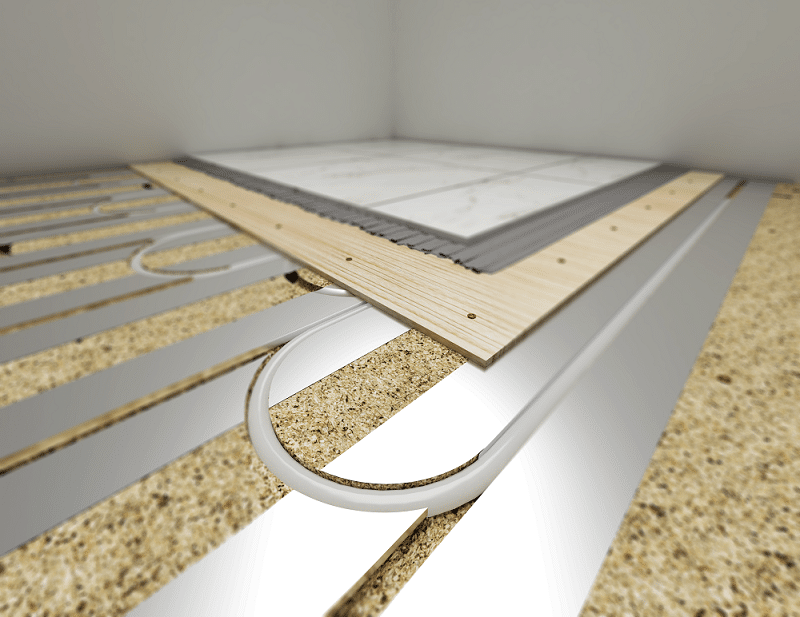Water and electric underfloor heating systems are an increasingly popular way to bring energy-efficient warmth to homes of all styles and sizes. As a relatively new technology, we understand that a common question people may ask when considering a new floor heating system for their home is “Which system is better for me? Water or Electric?”. Using this informative flowchart, we’ll take you through a series of questions to show you which system type will be the most appropriate for your needs.
What you’ll discover in Warmup’s underfloor heating flowchart:
- How you project type influences which heating system is best for you
- The impact of flooring on choosing between electric and water systems
- The installation requirements of water vs. electric floor heating
- Which system type is more affordable to install and cheaper to operate
- The maintenance requirements of each UFH system

How will my type of project influence which system I should install?
We offer a range of UFH systems suitable for both new-build and renovation projects but there are some variables which can impact on selecting the perfect system for your home.
If you’re building a new-build property from the ground-up and incorporating a new heating system designed from scratch, then a water floor heating system is a great idea. Water systems require a greater amount of space to install and operate than electric systems. You will need to create space for the heat source (either a boiler or more contemporary air or ground-source heat pump), pumps and the primary UFH piping too — all of which could be a significant consideration for smaller properties or smaller home renovations. If you’re renovating a larger property with multiple rooms or a home extension, then our range of VLo low-profile water systems offer a great solution. The VLo line has been specifically designed to bring energy-saving water underfloor heating to these kinds of projects.
Looking for a heating system for a smaller renovation project or interested in installing a floor heater in just one or two rooms in your home? Electric underfloor heating systems are perfect for such applications, offering the ability to be retrofit with ease. These systems take up minimal space, having little-to-no impact on existing floor heights.
Looking for more information on the differences between water and electric heating systems? Read our expert guide.
Will my flooring impact my decision too?
Your flooring finish and subfloor type can also influence which system will be best for you. We offer systems for almost all floor types from tiling to carpet, wood to vinyl. For floating floors including wood, vinyl and carpet, a lower temperature system is generally required to ensure that the floor surface does not exceed the heat limit. This may require lower water temperatures to be used or a lower wattage output for electric floor heaters.
The size of the floor area may impact on your choice too. For smaller areas (less than 25 square meters), it is generally more practical to install an electric system. In larger areas, including commercial areas, it may be wiser to install a water system.
Which is simpler to install: electric or water underfloor heating?
Electric underfloor heating is easier and quicker to install than water systems, particularly in projects where the floor covering is being replaced. With its innovative self-adhesive backing, our StickyMat System can be fully installed in a regular-sized bathroom in under a day.
Water systems will require a more complex installation and can typically be split into systems which offer a ‘wet’ installation method using concrete screeding into which the heating pipes are fitted or a ‘dry’ installation where the system can be fitted without this need for screeding. Read our guide to find out more about the differences between ‘wet’ and ‘dry’ water UFH installation methods.
It’s also important to ensure that there is an adequate energy supply for your new heating system. For water systems, it is important to confirm that your heat source is capable of supplying the heating system, not only in terms of capacity but also at the correct temperatures. If using an electric system to cover a larger heated floor area, you should make sure that the electrical supply to the property is sufficient to accommodate the extra demand in amperage. It may also be worth considering using renewable energy sources such as solar panels to supplement the running costs of the system.
Which system type offers lower installation and running costs?
Underfloor heating is a much more sustainable, energy-efficient way to heat a home, allowing energy savings of up to 35% compared to traditional radiator-based systems. With this increased efficiency, you could save hundreds of pounds a year on your energy bills.
Electric systems generally offer lower upfront installation costs through their simpler installation methods and because they won’t require the extra components that water systems do. Electric systems can be more expensive to operate though, as electricity tends to cost more than gas or other fuels but the running costs of these systems can be significantly reduced when used with self-produced, solar energy.
Due to a more labour-intensive installation, water systems will cost more to install but offer lower long-term running costs than electric systems due to their use of gas or other fuel sources. It’s also worth noting that water systems can be significantly cheaper and much more environmentally-friendly to run if they are well designed and supplied by a heat pump: the operational emissions of water systems installed with a heat pump be 4-5x lower than an electric system. Looking for more information about the compatibility of water UFH systems and heat pumps? Read our blog post.
Are there any differences in comfort levels between electric and water UFH?
If your space requires the floor to be heated very quickly, then an electric system is probably more suitable. Electric systems provide a very even heat distribution, as the heat from the heating cables transfer quicker to the floor finish than the heat from a water system’s pipework. If the floor is required to give out a slow, steady heat, then a water system might be a more practical option but it’s also worth remembering that the variation in water temperature can result in greater variation in surface temperature.
Before you install your new heating system, you must ensure that the maximum underfloor heating heat output is higher than the heat loss of your space. Well insulated rooms require less heat to be produced by the system and underfloor heating systems are always recommended to be installed alongside good-quality insulation to enhance its energy-efficiency and dramatically reduce heat loss. Many of our water systems come with accompanying or in-built insulation material while our Ultralight Underfloor Heating Boards are perfect to install with electric systems. You can find out more about reducing heat loss in your home in our in-depth guide.
All floor heating systems should be managed by a system-dedicated heating controller to provide precision warmth, zoned heating and optimal heat scheduling for your home. Electric floor heaters allow for every room to be independently controlled using floor and air sensors to continually read the temperature of the space. Water systems also allow for independent room control but floor temperature sensors are optional and small adjacent rooms are often grouped into a single zone to simplify the system. You can learn more about the benefits of zoned heating in our informative article.
Which system will last the longest for my home?
Warmup offer market-leading warranties for all our products and we are trusted around the world for our 24/7 365-days-a-year customer support. If you encounter any problem with your Warmup system, you can find a wealth of technical assistance on our online support portal or can contact us anytime.
Our range of electric heating systems typically have a lifetime warranty and are unlikely to fail in normal use and aside from electively upgrading the thermostat to the latest technology in the future, electric floor heating is maintenance free. The durable heating pipes used in our water floor systems have a lifetime warranty and can have a long lifespan, especially when properly maintained. The pipes and embedded elements are all maintenance free, but the system’s connected pump, actuators and actuator valves on the manifold will wear in due course.
Ready to purchase your new floor heating system? Find out how much a system will cost for your home using our easy-to-use online quoting tool. Simply enter some basic details of your project and we’ll help select the best system for your needs and let you know exactly how much it will cost to purchase.



![Thumbnail [200x250]](/wp-content/uploads/Electric-Category-Page-Image.jpg)
![Thumbnail [200x250]](/wp-content/uploads/Hydronic-Category-Page-Image-1.jpg)
![Thumbnail [200x250]](/wp-content/uploads/6iE-Projects.jpg)